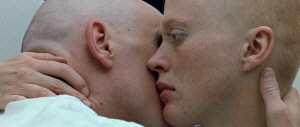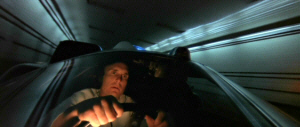Making movies. Enjoying movies. Remembering movies.
THE SCREENING ROOM
Related Articles
Interpreting The Sound and The Theory
George Lucas And His Magicians Are Honored In Hollywood
May 25, 1977: A Day Long Remembered
"THX 1138" D-Cinema & 35mm Engagements
|
Posted November 5, 2004 |
|
“THX 1138” Escapes To DVD |
By
William Kallay

Although most audiences know writer-director George Lucas as the creator of
the “Star Wars” and “Indiana Jones” franchises, he was also the director of
one of the starkest and most inventive films of the early 1970s, “THX
1138.” Some people, who may have never seen the film, might be surprised by
the bold vision Lucas and his collaborator, Walter Murch, put on the
screen. The world that Robert Duvall’s THX 1138 character inhabits is a far
cry from the fantasy world of “Star Wars.” Dark, surreal, scary, and often
brilliant, this film was a masterful entry into the world of filmmaking for
Lucas and Murch.
Warner
Bros. has now released the film on a 2-disc
DVD set
called “THX 1138: The George Lucas Director’s Cut.” There is also a single
disc version, but for this review, the 2-disc set is covered.
Beautifully restored, the film was cleaned up by Lowry Digital, who also did
visual cleanup work on the “Star Wars” DVDs. The last time “THX”
was available in a high-quality format was on LaserDisc. This rendition
makes this film, shot for a little over $700,000, look like it was made for
millions.
Disc 1
includes the new digital transfer of the film, commentary tracks from Lucas
and Murch, added visual effects (to seemingly increase the production value
of this low-budget flick), “Theatre Of Noise Experience,” “Master Sessions
With Walter Murch,” “Branching Video Segments Showcasing Murch’s Pioneering
Work,” multiple language tracks and a remixed 5.1 Dolby Digital soundtrack
(the original film was mixed and presented in mono sound). The disc is “THX-Certified.”
Even if
you’re possibly put off by the feature film, the commentary track is well
worth listening to. Lucas engages viewers with fascinating commentary on
how the film was really not a science-fiction film, but rather a look at
society and government of the early 1970s. The film still holds up today as
a parable on consumerism and our present government’s ever watchful eye on
society.
Murch
describes the nature of the soundtrack, which completely envelopes us into a
utopian ideal of a new world. For such a sparse film, both thematically and
production-wise, Murch’s sound montages are multilayered and add depth to
the audible world of this film. Considering that many low budget films of
the era had virtually no sound embellishment, this film’s soundtrack really
stood out. Too bad most audiences in 1971 didn’t hear it, since the film,
unfortunately, didn’t do much business. Now the film can be experienced in
5.1 surround sound.
 |
|
THX (Robert Duvall) holds LUH (Maggie Omie) |
Disc 2
features bonus material. “A Legacy Of Filmmakers: The Early Years Of
American Zoetrope” and “Artifact From The Future: The Making Of
THX
1138,” show viewers the foundation on which Lucas, Murch, Francis Ford
Coppola and others virtually rebuilt the film industry. The story of
American Zoetrope has been told before in print in such books as
“Skywalking” and “Easy Riders, Raging Bulls,” but this documentary comes
straight from many of the people who were involved with the company in the
early days. Also on this disc are “Electronic Labyrinth: THX 1138 4EB”
(Lucas' USC student film on which the feature film is based), a rather
dated, but fun documentary on the making of the film called “Bald,” and
theatrical trailers from the original release and present re-release.
“THX”
was an extremely low-budget production. In an era of counterculture movies
like “Easy Rider” (1969) and “Woodstock (1970), one might have assumed that
this film would’ve had success at the box office, since audiences were
embracing “counterculture” films and some studios decided it was lucrative
for them to bankroll young filmmakers. However, “THX” didn’t perform well in
theatres. After the release of “Star Wars” in 1977, Warner Bros.
re-released “THX” in theatres in an attempt to capitalize on Lucas’ stardom,
but the film still didn’t do well. Perhaps audiences were turned off by the
bleak atmosphere of the film. It was certainly not as fun as “American
Graffiti” or “Star Wars,” but it’s a film worth watching. In 2004, the film
received a re-release in theatres to promote the release of the DVD.
 |
|
Donald Pleasance as SEN |
Picture
and sound quality are outstanding. The film was shot in Techniscope, a
spherical widescreen process designed to produce a 2.35:1 aspect ratio on a
low budget, and this is the best the film has looked for the home theatre
market. The imagery, shot by by David Myers and Albert Kihn, is visually
stunning. The film was shot in a controlled “documentary-style,” in which
long zoom lenses were used to convey a voyeuristic look. The
cinematographers utilize the widescreen to break the frame into sections at
points in the film, or the frame is used to isolate characters in some
scenes with entirely white landscapes. It’s arty, and it works.
The
Lowry Digital transfer gives this film new life. It feels like it was made
this past year. In a way, this transfer is superior to that of “Star Wars:
Episode IV - A New Hope” on the recent
DVD set
of the original Trilogy.
Murch’s
sound design has been elevated to a new level of higher fidelity than
previously available. The Dolby Digital remastered soundtrack breathes life
into his original mono mix. The sound is clear and natural and doesn’t feel
like a remixed soundtrack of an older movie might feel. Years ago, David
Lean’s brilliant “Bridge On The River Kwai” (1957) had a brand-new sound
effects mix added to it. The result was criticized by many who felt that
the film’s original mix was perfectly fine, and didn’t need modernized
surround sound with birds chirping all around you. The remastered
soundtrack on “THX,”
on the other hand, sounds “right.”
Lucas
has been criticized for his latest films of being devoid of human emotion.
He’s even been noted for his simplistic approach to directing. “Faster.
More intense” was apparently his motto he used with the actors on the set.
But looking at “THX”
and “American Graffiti” (1973), either the actors he’s worked with were so
good, or he had some kind of mental telepathy with them, because the
performances in “THX,” though with minimal dialogue, are excellent. Robert
Duvall is perhaps one of the best actors of our time, and in this role, he’s
in command of his performance. Without overacting, he conveys to the
audience that he’s looking to escape this cold, sterile world in which he
lives. We believe his yearn not only for escape, but for his love of LUH
(Maggie McOmie). Also great are Donald Pleasance, who plays the conniving
SEN 5241, and Don Pedro Colley, who plays the likable hologram, SRT. Lucas
deserves credit for getting the most out of his actors, as well as making
this low-budget film seem more expensive and grand than it really was.
“THX”
has received some digital effects additions, but they’re not as obvious and
intrusive as they are on “A New Hope.” The best part of the film, the car
versus motorcycle chase, has a few tweaks, but again, they’re not too
distracting. It’s a visceral scene to begin with. The new additions to
this scene, which include some clever shots of THX’s car zooming in and out
of traffic, are a car buff’s dream. It’s simply “cool” to watch these
souped-up cars racing to Lucas’ pictorial editing and Murch’s sound design.
As with
the recent “Star Wars Trilogy”
DVD
release, “THX 1138” is a must-have for Lucas fans. Though quite a contrast
to “Star Wars” and “American Graffiti,” this first feature film stands on
its own as a classic from a talented filmmaker.
 |
|
THX on the run |
THX 1138
Warner Home Video
Catalog Number 11162
Region 1
16:9 Widescreen (2.35:1)
Dolby Digital 5.1
THX-Certified
DVD Release Date: September 14, 2004
$26.99 (2-Disc Version)
Rated R
Two DVD-9 Discs
1971
90 minutes
Color
Director: George Lucas
Stars: Robert Duvall, Donald Pleasance, Don Pedro Colley, Maggie McOmie, Ian
Wolfe
 |
Artwork © Warner Bros. Entertaiment All rights reserved.
